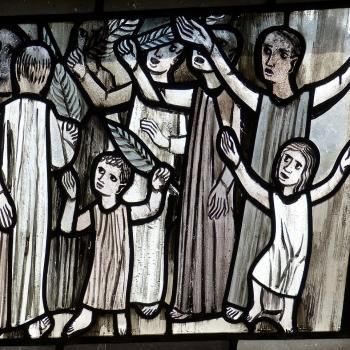My college campus is in the middle of a (hopefully) temporary lockdown, due to a spike in Covid-19 positives last week. After a monumental effort over the summer to make it possible for us to open campus at the end of August to in-person students, followed by three weeks of apparent success, classes are now fully remote as they were for the last half of the spring semester. On campus students are restricted to their residences on campus, as off-campus students are required to isolate in their residences; everyone will take their classes remotely from there. If we are able to get control of the situation, all are hopeful that we will be able to return to hybrid in-person/remote classes within a week or two. Our campus, of course, is not unique in this—every institution of learning in the country is figuring out how to do this on the fly. It’s very much like building a boat while in the middle of the ocean. Are we having fun yet?
My first remote classes this week were two Monday two-hour seminars with groups of seventeen sophomores, students whom I fortunately have gotten to know in person over our first three weeks of Monday seminars. The texts for the day, thankfully, were materials guaranteed to generate discussion: Karl Marx’s essay on “Alienated Labor” from Economic and Philosophical Manuscripts of 1844, as well as Marx and Friedrich Engels’s The Communist Manifesto. In a study guide intended to frame the texts and our upcoming discussion for the students, I gave the following advise to the students:
My advice for reading Karl Marx is the same advice that I give freshman students before they start reading the Bible. You may think that you know a lot about what this author has to say, but you don’t. Read the text carefully and pay close attention to what it actually says, not to what you have heard about it
Accordingly, I began each seminar by telling my seventeen students on Zoom “I’m going to read you a story.” As they listened to my story, probably only half (at best) of them knew where the story is from. It is one of the most challenging and provocative stories in the Gospels; it also happened to be last Sunday’s gospel lectionary reading.

Jesus introduces us to a landowner who needs workers in his vineyard; the situation described has a very contemporary feel to it. People out of work gather at an agreed location in the hope that they will be one of the few picked when bosses with work available arrive at the crack of dawn. Those looking for work might not have proper documentation, might be illegal immigrants—whatever their situation, they are not blessed with the security of regular employment.
The vineyard owner or his representatives arrive at dawn, agree with the handful selected to work on the wages that will be paid for a day’s labor, and those who are not selected are left unemployed for yet another day. But the harvest is ready to be gathered, and the owner returns every three hours, at 9:00, at noon, and at 3:00, hiring more workers each time. Even at 5:00, a few more are grabbed from the marketplace to help make a final push in grape-harvesting for the final hour of the work day.
Only when wages are paid do things get really interesting. The vineyard owner pays all of the workers the same amount of money, no matter how long they worked. Why does he do this? I’ve used this story many times in classes over the years, and my students’ initial reaction is to assume that the landowner has bought into a social and economic experiment that forces him to pay everyone the same, no matter how hard or long they have worked. Some sort of bleeding-heart liberal, perhaps, a “socialist” nineteen centuries before his time.
But when the landowner responds to the complaining laborers who have worked all day and have just been paid the same amount of money paid to the one-hour people, it is clear that this is no economic innovator or radical:
Friend, I am doing you no wrong; did you not agree with me for the usual daily wage? Take what belongs to you and go; I choose to give to this last the same as I give to you. Am I not allowed to do what I choose with what belongs to me?
In the vineyard owner’s world, contracts mean something. This is what we agreed to—this is what is going to happen. And in the vineyard owner’s world, the profits from his vineyard are not common property—they are his property. If we anachronistically apply our contemporary categories to this ancient story, the vineyard owner is a first century capitalist through and through.
So why does he distribute wages in such a non-capitalistic way? One of my students made an interesting connection here, tying the parable into something I included in the reading guide for the Karl Marx materials we had read for seminar. At Marx’s funeral in 1883, Friedrich Engels, the co-author of The Communist Manifesto, included the following in his eulogy of his old friend and companion in revolution:
Just as Darwin discovered the law of development of organic nature, so Marx discovered the law of the development of human history: the simple fact that man must first of all eat, drink, have shelter and clothing, before he can pursue politics, science, art, religion . . .
What makes human beings equal, in Marx and Engels’ estimation, is that we all have the same needs, needs that must be satisfied before we start thinking about politics, economics, discovery, competition, or any of the higher human creative achievements. A work place and/or economic system is fundamentally unjust if it requires human beings to compete for the things we all need in order to live a basic human life and have a chance of success and happiness. The revolution that Marx and Engels called for and predicted begins at this point.
Returning to the parable, the landowner clearly has this same law of the development of organic nature in mind. In the Kingdom of Heaven, which is the kingdom that it is the responsibility of all of us who profess to follow Jesus to establish on earth now, familiar rules are not eliminated. Rather, they are transformed. With Kingdom of Heaven eyes, the landowner sees something more important than profit—he sees that at the most basic level, all human beings share the same needs. A daily wage is meant to meet daily needs—and each person has these needs regardless of how long they work. The vineyard owner never asks why his workers were unemployed, nor does he ask why some of them were unavailable for work until late in the day. These details simply do not matter.
What does matter is that each of the workers at the end of the day needs the same things, and the vineyard owner chooses to satisfy those needs out of his own money. In the opinion of those who worked all day, they deserved more than those who came late. In the eyes of the landowner, all deserve a daily wage because all have the same needs. It turns our expectations upside down and violates our comfort zone. As Jesus explains, “the first will be last, and the last will be first.” That’s how things work in the Kingdom of God. The more you have, the more opportunity you are provided to give it away.
A verse from the prophet Micah, a verse that I return to more and more often when thinking and writing about how to live a life of integrity to one’s faith and one’s fellow human beings, tells us that what God requires of us is to “do justice, love mercy, and walk humbly with our God.” The genius of the vineyard owner in the parable is that he is an embodiment of Micah’s directive.
The vineyard owner embodies humility because although technically the profits from the vineyard belong to him, he understands that everything we have is a gift, and that the only possible response to such generosity is to channel the generosity outward.
The vineyard owner understands that justice is never spread evenly in terms of talents, wealth, abilities or anything else—it is our responsibility to create, just as he does at the end of the work day, a world in which all human needs are responded to equally, regardless of which humans have the needs.
Lastly, the vineyard owner is merciful because he sees his laborers not as necessary cogs in the money-making machinery, but as fellow human beings with whom, at least for this day, he can share his abundance willingly and liberally. Justice. Mercy. Humility. That’s what the Lord requires of us. Let’s give it a shot.

















